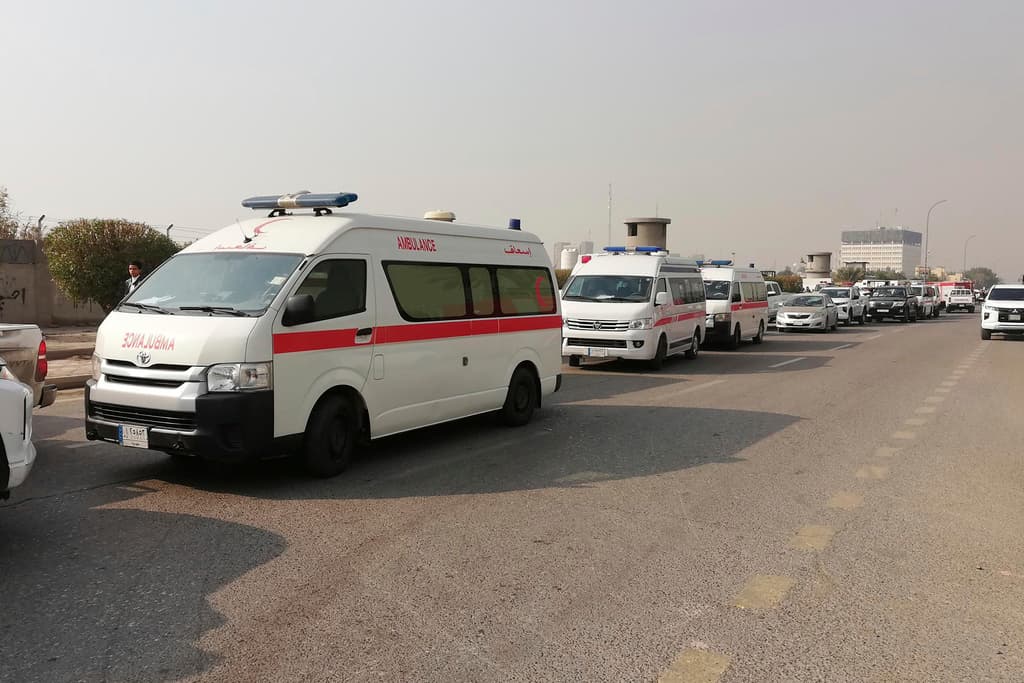America Steps Up in Mideast Proxy War, With an Attack That Claims an Iraqi Militia Leader
Hezbollah’s Nasrallah ends a speech by suggesting, wryly, that he’ll return Friday — ‘That is, if I’m still alive.’

The killing Thursday of an Iraqi militia leader marks a first retaliatory measure following more than a hundred attacks on American troops in Iraq and Syria since October. Is this a one-off action or a sign that America is finally joining the war on the Iranian proxies that have been menacing the Mideast?
Two members of the Shiite group Harakat al Nujaba were slain by missiles shot from an American drone toward the militia’s Baghdad headquarters, an official in Washington told Reuters. The Iran-backed terrorist group, responsible for numerous attacks on American bases, identified one of the dead as a militia leader.
“The deputy commander of operations for Baghdad, Mushtaq Talib al-Saidi, was martyred in a U.S. strike,” Harakat al Nujaba said in a statement. The group is a member of the Population Mobilization Force, a coalition of Shiite militias, including some that are attempting to end America’s presence in Iraq.
Each of the Iraqi anti-American militias is smaller than other terrorist groups cultivated across the Mideast by the Islamic Revolutionary Guards Corps’s Quds force. Yet, together they form a formidable force, the managing editor of Long War Journal, Bill Roggio, tells the Sun.
These armed groups can attack Iran’s strategic Sunni rival, Saudi Arabia, which shares a border with Iraq. Also, Mr. Roggio asks, “what if these Iraqi militias send fighters and commanders to fill the ranks of Hezbollah?” Iraqi militias consist of a “strategic reserve force” that can join the war on Israel from Syria and Lebanon, he adds.
America had offered only token bombing of Syrian weapon warehouses and empty buildings in response to numerous rocket attacks on the 2,500 American GIs stationed in Iraq and 900 in Syria as part of the war on ISIS. The targeted killing Thursday of an Iraqi militia rankled the Baghdad government, which counts the PMF as part of its ruling coalition.
“We view this action as a dangerous escalation and assault on Iraq, diverging from the spirit and the text of the mandate and the mission for which the Global Coalition was established in Iraq,” a spokesman for the Iraqi military, Yehya Rasool, said in a statement. Yet, Baghdad stopped short of demanding a departure of the American GIs.
The drone strike at Baghdad is adding to a spate of events that are raising Mideast tensions. They include Thursday’s funeral of the Hamas leader killed earlier in an Israeli drone strike at Beirut, Saleh al Arouri, and a major escalation of the Houthis assault on Red Sea shipping.
Representatives of all Iranian-backed Mideast terrorist organizations regularly meet at Beirut to coordinate attacks. There, the Hezbollah chief, Hasan Nasrallah, “has played a leading role in cementing the alliance, as the most senior figure commanding the oldest, most successful and battle-hardened group,” the Washington Post reports.
Yet the Yemen-based Houthis are emerging as a major player among these terror groups. For the first time, the Houthis on Thursday launched an armed surface vehicle — a maritime explosive drone — that detonated a couple of miles from Navy and commercial ships sailing the Red Sea.
Hours earlier, America, along with Australia, Bahrain, Belgium, Britain, Canada, Denmark, Germany, Italy, Japan, Netherlands, and New Zealand — but not France — issued a joint statement warning the Houthis against further harassment of ships in the Red Sea: “We call for the immediate end of these illegal attacks and release of unlawfully detained vessels and crews.”
More than 12 percent of the world’s commercial maritime traffic passes through the Red Sea. While killing an Iraqi militia commander is an important step, America needs to go beyond statements and act militarily against the Houthi disruption there, Washington critics say.
“Inaction in Iraq and Syria is worrisome, but by declining to confront the Houthis, we are elevating a militia with a local impact to an international menace,” Mr. Roggio says. Issuing joint statements “is what you do when someone steps on your toe, not when someone continuously hits you in the face.”
The killing of a mid-level Iraqi terrorist is nevertheless a signal that America is ready to go beyond its lethargic response to Mideast terrorism. To succeed, it needs to be followed up, as was the strategy in previous campaigns against terrorism in Afghanistan and Iraq.
Israel’s comparable campaign of killing Hamas leaders in Gaza is accelerating with additional intelligence gleaned from captured terrorists. A commander of the Palestinian Islamic Jihad, Mamdouh Lolo, was killed there by a drone on Thursday, following the biggest Israeli success so far in the war, the killing Tuesday of al-Arouri, Hamas’s top strategist.
In a major address Wednesday, Hezbollah’s Hasan Nasrallah made a remark that was largely seen as a bitter reference to al-Arouri’s killing. After saying he would return for yet another speech on Friday, Iran’s top Mideast asset wryly added, “That is, if I’m still alive.”

